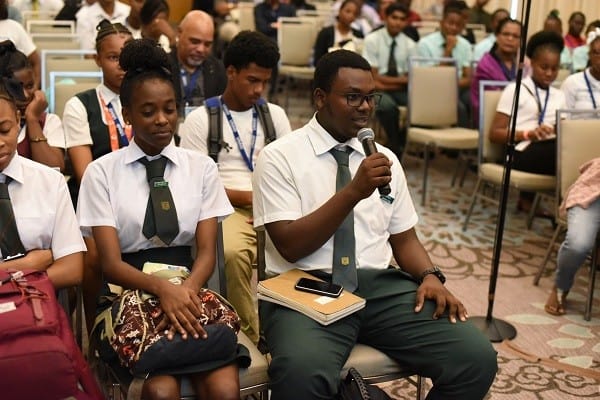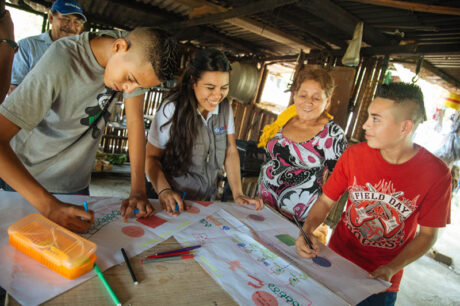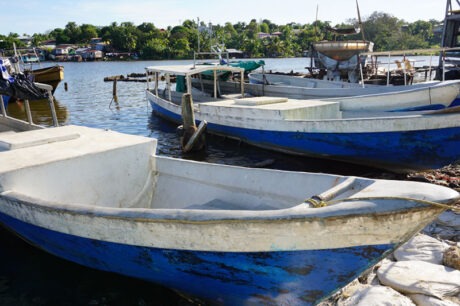Georgetown, GuianaYouth leaders and policymakers from the Caribbean rallied around the issue of youth-led violence prevention at a recent United States Government-supported summit that provided them with a blueprint for building peace in their respective communities. O janeiro 15 e 16 Caribbean Summit on Youth Violence Prevention was attended by nearly 270 people from more than 20 países.
The centerpiece of the Summit was the Caribbean Youth Advocacy and Action Agenda for Violence Prevention, a draft guiding document for policy and programming developed by Caribbean youth leaders over several months. The drafting of the Agenda was spearheaded by the Aprendizagem para Networking Juvenil e Sessões de Mudança (LINCHES), a regional learning network on youth-centered violence prevention.
“The time for action is now. We have to be more strategic in our approach if we are to create a culture of peace,” said Kurba-Marie Questelles, LYNCS Steering Committee co-chair, at the Summit’s opening ceremony. “What we’re here to do is bring everyone together, and this is where the Advocacy and Action Agenda comes in.”
The Summit was supported by the NÓS. Agência para o Desenvolvimento Internacional (USAID), através do seu Comunidade, Programa de Resiliência Familiar e Juvenil (CEREJA), alongside partners UNICEF, CARICOM, o Organisation of Eastern Caribbean States, o Caribbean Development Bank, e o Commonwealth Secretariat. It was designed to support USAID’s approach to sustaining program outcomes far beyond the life of the project by engaging local partners, building their capacity, and providing them with the tools to foster local solutions.
At the heart of the Agenda and the Summit was the idea that youth must be included as leaders in preventing violence within their own communities and the region at large. “We are all a part of the process, and we are necessary to creating and maintaining that peaceful Caribbean community,”Questelles disse.
Youth-led dialogue
The high-energy Summit saw youth actively engaged as moderators, panelists and discussion participants, giving their thoughts on topics such as healthy masculinity, gangues, intimidação, the arts as a tool for violence prevention, and mental health. Youth made up over 50 percent of the participants and included 36 high school students from the Georgetown area who actively engaged in sharing their perspectives.

Officials in attendance voiced their support for the Agenda and for youths’ role as leaders in innovation and building peaceful and resilient communities.
“Peacebuilding cannot be for the government alone; it is everybody’s business,” remarked Dr. the Hon. George Norton, Guyana’s Minister of Social Cohesion, who represented the President at the Summit. “It is a pleasure for me to therefore congratulate you on this Summit, as we do need young people, youth leaders with governments and other agencies to champion preventative measures in the area of youth violence.”
Summit leaders and speakers encouraged attendees to keep the momentum going, to remain engaged in the conversation and to take the ideas and information gleaned from the Summit back to their own communities and countries.
“It’s really nice to see what’s happened over the past two days, and we don’t want it to just remain here,” said Asha-Gaye Cowell, LYNCS Steering Committee co-chair.
Closing out the Summit was the Hon. Shamfa Cudjoe, Minister of Youth and Sports for Trinidad and Tobago, who endorsed the Action and Advocacy Agenda on behalf of the other government ministers in attendance. She urged all those in the room to work together to bring the Agenda to life and make a real difference in the region.
“This is a call to action for not just government, but for youth, the young people,"ela disse. “We all have a role to play as it relates to this Action Agenda. And something we need to ask ourselves as youth leaders here today is, ‘What am I going to do when I get back home?’ Because we as governments need your help to make this thing a reality.”
The event culminated with attendees providing feedback on the Agenda’s three pillars – prevent crime and violence; promover a inclusão social; and promote reintegration – drawn from CARICOM’s Social Development and Crime Prevention Action Plan, which has been mandated by the Council for Human and Social Development and endorsed by the Heads of Government for inclusion in national plans across the member countries.
Input from the Summit and follow-up conversations with youth networks around the region will ultimately shape the finalized Agenda, which will serve as an overarching framework for policy and programming on violence prevention.



